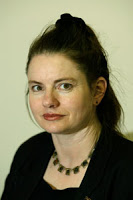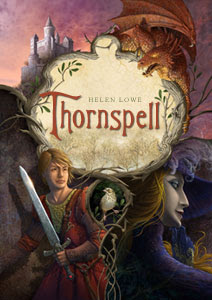Helen Lowe is a New Zealand poet and novelist. Her first young adult novel, Thornspell, has just been published by Knopf in the USA, and she has a further YA novel and a four-book series of adult fantasy novels accepted for publication in the US. I talked to Helen by email about her writing, her forthcoming books, and the process of getting published in the US.
First of all, congratulations on the publication of Thornspell. What can you tell me about the book, and where can interested readers find out more information, and copies to buy?
Thornspell is a Children’s/YA Fantasy fiction and at the most simplistic level it’s a fairytale retelling of the Sleeping Beauty story – but that’s where the resemblance to the traditional story pretty much ends, because Thornspell is all about the prince. In fact, that’s where the story started for me –with the question (while at the ballet, Sleeping Beauty): “What about the prince?” Other questions quickly followed: ‘What sort of person would he be?’; “Why would he even be bothered about some sleeping bint and an 100 year old spell?” And I had this mental ‘flash’ to a boy, around about eleven at that time, growing up in a small castle next to a mysterious and forbidden wood – and to his name, which was Sigismund and instantly linked me—and I hope the reader—into a world that is very ‘Holy Roman Empire’ in feel. But very soon after “what about the prince”, a second set of questions arose: “What about the evil fairy? Would she have just been sitting around happily accepting that her death spell had been converted into the one hundred year sleep?” (I didn’t think so, not if she was really wicked.) “And what was her real agenda?” Those two sets of questions were the beginning of Thornspell and the rest evolved from there and very much in the style of the Fantasy fiction I like, which is plenty of adventure, plenty of mystery and plenty of magic.
In terms of more information, I have an “official” website, http://www.thornspell.info, where visitors can read a synopsis and the first chapter of the book (or download it in pdf format). I have also taken the images from the cover and made them all (double)”clickable”, taking the site visitor to a quote that is relevant to that character or image. The Thornspell site also links (through “About Helen Lowe”) to http://www.helenlowe.info, which contains information about my other books as well as my short fiction and poetry.
RandomHouse USA have arranged for the distribution of Thornspell in Australia and NZ and it should be available in bookshops here from early October – Madras Café Bookshop here in Christchurch already have it featured on their electronic catalogue.
You’re following up Thornspell with an adult fantasy series – four books. How far through writing these are you, and is everything that remains to be written carefully mapped out?
Actually, I’m following Thornspell with another Children’s /YA fantasy, working title YRTH, and have just finished the first draft. Like Thornspell, YRTH is a standalone book but it is not a sequel—it is a new story set in a completely different world. The broad synopsis is at http://www.helenlowe.info/yrth.html.
But I will have to get into THE WALL OF NIGHT (WALL), the 4 book adult series, as soon as YRTH is done. I have written the first book in the series (titled WALL, too) and am about a third of the way through the second book—but because it is a series I did a detailed outline to show potential publishers that I knew how the story would play out. I think the writing will pretty much follow that story arc, but I am also quite an organic writer so things may change as I go along—they have with both Thornspell and YRTH—although I always seem to start and finish as originally envisaged.
Without giving too much away, what can you tell us about the setting and storyline of that series?
At face value, I would describe WALL as classic epic fantasy—with forces of good and evil, action and alarms, swordplay and sorcery, set in the alternate fantasy world of Haarth and on the bleak and wind blasted Wall of Night itself. But within that framework, WALL examines the themes of good versus evil in the context of a society that believes it champions good and yet is divided by prejudice, suspicion and fear. It also explores the consequences of the cataclysmic arrival of two alien and warring cultures on another world, both in physical and cultural terms. The central purpose of the overall story, as told through the four books, is to force the protagonists to examine their understanding of the nature of good and evil, both in their own society as well as that of their enemy. Given this, you won’t be surprised if I tell you that it is as much character as plot driven—although I think that this kind of story needs a strong plot structure—and also explores a number of different landscapes and cultures as part of the story setting. My favourite, beside the Wall itself? Possibly the city state of Ij—but then there’s also the Emerian knights . . . Oh yes, and there’s a great map as well (drawn up from the hieroglyphics I fondly refer to as “drawing”) by my friend Peter Fitzpatrick, which can be seen (although only in small scale at this stage) on the Wall of Night page at http://www.helenlowe.info/wallofnight.html
I first came across your work when editing JAAM 26, and I was struck by the expert use of classical themes in both your fiction and your poetry. It’s clearly a period you have a deep knowledge of. Where did this interest start, and does it underpin all your writing?
It began when I was 8 years old and my teacher had a poster of the 12 Olympian gods up on her classroom wall. I loved that poster and it inspired me to read every book I could find on the Greek myths and legends, including junior versions of the Iliad and Odyssey (I read the real thing later, but I was only little back then!). From there I progressed to Norse, Celtic and Egyptian myths, folktales and legends, amongst others—but also to the history of the ancient Greek era, including both the archaic and 5th century BC periods, and of course, Alexander the Great. I’ve also read a fair bit about the Roman Empire at different periods, but the Greek era, including its literature and philosophy is my first love. The stories and poetry just come out of that, and so—I suspect—does the Fantasy fiction.
Who are your favourite writers, both novelists and poets?
Ah, the pressure of the favourites! There are so many! But books I have loved, besides all those collections of myths and legends . . . well, I first read The Lion, the Witch and the Wardrobe about that time, as well, and I really loved it. The Lord of the Rings (of course) and Dune was also formative about the same time (my early teens). I’ve always loved Ursula Le Guin’s Earthsea trilogy and also The Left Hand of Darkness and sticking with SciFi-fantasy, I also rate Patricia McKillip’s Riddle Master of Hed trilogy and CJ Cherryh’s Downbelow Station. (And, and … McKinley, Pullman, Wynne Jones, Pierce, George RR Martin, Erikson . . . and . . . )
I have just realised that you said “novelists” and not “books” but I’ll stick with the books for the moment: Mary Renault’s 5th century BC Athenian “trilogy” (The Praise Singer / The Last of the Wine/ The Mask of Apollo) and Gillian Bradshaw’s “The Beacon at Alexandria” (amongst her others). And I always have to include Pride & Prejudice, Aldous Huxley’s Eyeless in Gaza and Harper Lee’s To Kill a Mockingbird. In terms of NZ writers, I read Witi Ihimaera (Whanau) when I was living overseas and it was the first time I had ever read a NZ novel where I thought, yes, I’m home . . . I also like Patricia Grace and Fiona Farrell and I loved The Bone People . . . and yes (defiantly) I rate Mansfield: I still think Miss Brill might be my personal ‘best ever’ short story. Having said that, I couldn’t put Charlotte Grimshaw’s Opportunity collection down either.
But I think I’ve really run out of room for poets—because the list is pretty much as long again!
I suppose the question every writer will want me to ask is: how did you go about getting a US agent?
I used the web, by looking at writers I thought had written books of like kind to Thornspell, eg YA Fantasy, fairy tale retellings etc and tried to find out who their agents were—and several of the arrows (eg Pullman, Paolini, McKinley, Lisle) led me to Writers House in NY. After that I just followed the guidelines in their FAQ to the letter, eg inquiry letter & synopsis first, then first 3 chapters on request, then full manuscript etc. I also addressed my letter to 1 person (rather than sending to all the agents at once as I understand some writers do) which I found out later was a “good thing” as Writers House do circulate the queries around the different agents and their assistants anyway. As it happened, I wrote to the “wrong” person, in that this was an agent who represented YA, but not Fantasy, but her assistant screened to first 3 chapters level and then circulated to another agent (Robin) who did look after Fantasy. And first Beth, Robin’s assistant, and then Robin herself, liked Thornspell straight off, so I guess I was lucky in that respect.
You are in the unusual position (at least among writers of my acquaintance) of being contracted four books ahead of the book that’s about to be released. Does that free you from a lot of the pressure felt by writers who need a success with their current book to make sure the next one gets published, or does it create its own pressures?
I think it creates its own pressures, because for the first time I am writing to external deadlines, and I am a bit of a perfectionist so I want to get the story ‘right’ to my satisfaction before putting it “out there” … but it is nice to have the contracts there. But I also think that it’s important to remember that WALL is a 4 book series, and not 4 standalones, so it is logical that the publisher would want to contract all 4 ahead and protect their investment in the first book, since they are taking on the upfront work of bringing out a new author.
Will you be hitting the science fiction convention circuit to promote your books? If so, can we hope to see you as a guest at forthcoming New Zealand conventions?
Well, I have joined SFFANZ and it would be fun to get along to their next convention in any case, as well as being very keen to do all that I can to promote my books. And I understand that Worldcon will be in Melbourne in a few years and that is not so very far away distance-wise, but as with all these things it comes down to timing (re events and promotions) and available funds at the time. But I would love to ‘be there’ whenever I can. As for attending as a guest, well, first I would have to be invited (!)
A tough one to end on: if you had to choose three words to describe your writing, what would they be?
Hmm, that is tough … three words … (ok, I borrow from my initial reviews): authentic, rich, human.



